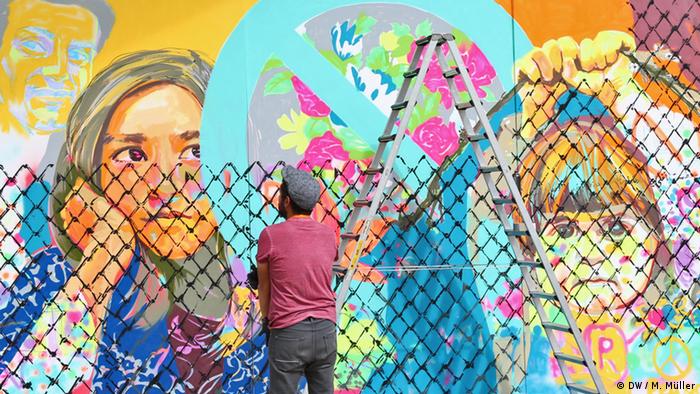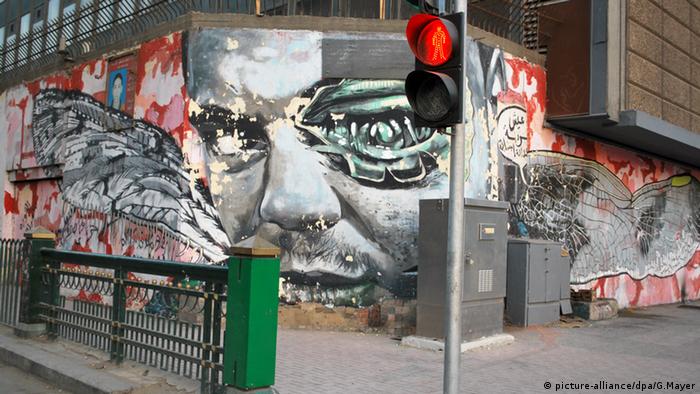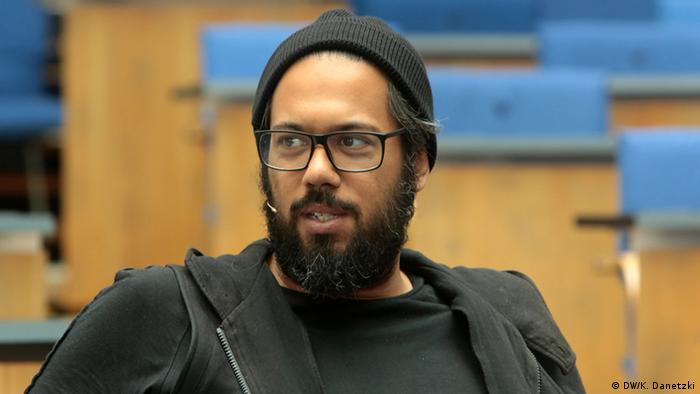The Global Media Forum
Global Media Forum: art against violence
At the international media conference artists from the Middle East, and Germany to tell, how they change with Rap or Satire the society.

Countless people have died in Wars and violent Regimes in Syria, Iraq and Egypt. In Germany, the population of the refugees from these countries becoming increasingly hostile. In these hard times, but there are also bright spots. One of them is the art.
Be it classical music, the street children to distract for a few moments from the war, a satirical show without respect for incompetent members of the government, or rap songs against racism – all of these art forms to the people of hope.
“We all hope for peace in our countries,” says the Egyptian artist and wall painter Ammar Abo Bakr in a discussion about culture in times of crisis during the Global Media forum (GMF), the DW in Bonn, Germany. “Art is important.”
Change through Satire
Abo Bakr began during the Arab spring in 2011, to paint his works of art on walls across Cairo and spraying. “He reported on the walls of the city, about the Revolution,” describes Kate Müser, culture editor of the DW and the moderator of the discussion, his work.

Street art by Ammar Abo Bakr on the wall of a House in Cairo
To inform the citizens about current events, although the government would prefer to be as ignorant lemmings – this is a goal that can reach art in a difficult environment. The satirist, Ahmed al-Basheer, who lost his father and other people close to them in the war in Iraq, clarifies with his satirical TV show the viewers about the machinations of the government. Initially, it was not, however, easy to excite, the Iraqi audience for such a snappy show: “If you’re doing the Iraqi Prime Minister funny, are you about Iraq, funny, was one of the reactions,” explains al-Basheer during the GMF event.
The turning point came when his audience realized that they can trust him – and the show really made something. Some politicians changed their behavior, because they wanted to not be the target of ridicule in the show, al-Basheer. If you do about an Iraqi politician funny, was for him “more painful, than if you hit them in the face,” says the satirist.
“Maybe I don’t come back”
Pianist Aeham Ahmed tried to be in the audience of the horrors of war to distract. The Palestinian refugee played the piano for several years on the streets of Syria. He mixed classical music from composers such as Rachmaninoff with Syrian folk songs, while all around him the world went under.
“When I went to Syria out of the house, I said to my wife, I might not come back,” recalls Ahmed. “But I told her that I would do good and would not fight.”
Watch the Video
01:25
Share
Buttons instead of words: Aeham Ahmad in an Interview
google+
Tumblr
VZ
Mr. Wong
del.icio.us
Webnews
Yigg
Newsvine
Digg
Permalink : http://dw.com/p/1J5hD
Buttons instead of words: Aeham Ahmad in an Interview
It was nice to have something for the kids there done. “You have laughed,” says Ahmed, to the applause of the audience. “I must not trigger a Revolution, I just play the piano and see the smile of children.”
Eventually, the Horror and the bombs became too much, and Ahmed, once again, to the refugee. He came to Germany and now plays for the people here on the piano. In his new home, no bombs falling from the sky. The German democracy must beat Ahmed here with it’s very own “art form” around:. Up to now it has not managed to Ahmed, his wife, to Germany to catch up. For this, he was ashamed.
Rap against racism
The German Rapper Samy Deluxe and Fetsum use their music as a voice against racism which confronted refugees like Ahmed, if you come to Germany. “Music is perfect for this, to build bridges,” says Fetsum at the panel discussion.

Samy Deluxe-rap against discrimination
Deluxe, whose father is from Sudan, told that he had been teased as a child and teenager mercilessly, and I have experienced discrimination because he looked different from his white classmates.
Today, he helps young people with problems, by visiting schools and Hip-Hop Workshops. With his lyrics, and talk-show appearances, he also tried to offer the growing xenophobia, stop, posed by parties like the Alternative for Germany (AfD). “People ask if I’m from the AfD shocked,” says Deluxe. “But that’s nothing New. So people behave when they are afraid.”
The lack of women
The discussion on the GMF-Podium shows how the various art forms of society can influence. An important perspective, but I have been missing from the point of view of some viewers: Why was not a single female artist on the Podium?
“It is 2016, since we should not have this discussion without women,” said the Kenyan journalist, Wanjiku Mwaura, who lives since January in Bonn. For them, the role of women in the story had been ignored much too often. Following the event, she tweeted a list of artists from the Arab region.
A fellow participant just gave me a list of female artists. @mykali_mag #dw_gmf pic.twitter.com/rVBdvtphnc
— Wanjiku Mwaurah (@WanjikuMwaurah) 15. June 2016
If the organizers listen to the complaints, the next Global Media Forum so no pure men rounds. This would then be another example of how cultural exchanges can change a society.